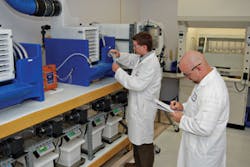Expert Q & A: Meeting and Solving Industrial Water Conservation and Regulatory Challenges
U.S. Water Services is a leading national provider of integrated solutions for water treatment. Brand Manager Karen Danielson shares her insights on what's driving industrial water treatment technology innovation and how her company is rising to the challenge.
Industrial WaterWorld: What do you see as some of the major challenges plants and producers face with regard to water?
Karen Danielson: Water conservation and regulations, while positive things because they help preserve natural resources and lessen environmental impact, will always be challenges that plants face because of the impact on water availability and product use.
IWW: Can you elaborate on some of the impacts of water conservation on your customers?
KD: Both the boiler and cooling systems in plants can have an impact on water use. In most plants, the cooling towers require the largest volume of water. Water absorbs waste heat and transmits that heat to the atmosphere by evaporation. The materials dissolved in the water do not evaporate but instead concentrate in the remaining water. Boilers, because they operate at higher temperatures, require water with higher purity. Different boiler designs require different water quality
Many industries are focused on water conservation due to the increasing risks of water scarcity and wastewater disposal limitations to their operations and sustainability initiatives. Water discussions are taking place around the nation regarding water use, reuse, and reduction. Climate change is a driving force for many of these conversations. For others, the conservation is driven by budgetary concerns. Regardless of how the conversation develops, one thing is clear: using water efficiently just makes good business sense. Conserving water is one way to cut costs without compromising products or services. Financial incentives may also be available for industries that reside in geographies with conservation initiatives, like the rebate and incentive programs available to help California facilities reach their 20% water reduction goal by the year 2020, or the programs available in Texas targeting water recycling and reuse systems. The bottom line is that conserving water can help increase profits.
IWW: You mentioned regulatory challenges. What are some specific examples?
KD: Discharge regulations are coming under stricter scrutiny. For instance, phosphorus has long been recognized as the controlling factor in plant and algae growth for many lakes and streams. A minor increase in phosphorus can fuel substantial increases in both aquatic plant and algae growth, which can have severe impacts on a community. The use of phosphorus-bearing compounds in industrial cooling and boiler water treatment programs has been commonplace since it replaced chrome in the early 1970s. Restrictive phosphorus limits are being enacted or proposed in many geographies of the U.S. where the receiving water streams are particularly sensitive to changes in phosphorus levels. Other corrosion inhibitor treatments are off the table as well since most programs available are primarily based on utilizing metals such as zinc or molybdate, which are also being closely regulated. That's one of the reasons why U.S. Water developed the PhosZero™ with E-FeX™ technology -- as a replacement for other phosphorus-bearing cooling tower corrosion inhibitors.
These restrictions on discharge and water use can cause compliance concerns for industrial plants, making effective products obsolete, forcing change to new products, and impacting overall profitability. It's important to get a good water treatment provider -- one that knows your plant and can monitor the parameters necessary to ensure compliance and overall plant efficiency.
Further efficiencies in water and energy use in the industry are necessary to meet future regulations that will continue to limit water use and impose stricter water discharge regulations. Plants must find ways to minimize water treatment and discharge costs in order to afford costs incurred by potential changes in regulatory compliance requirements. Plant operators must also plan ahead, ensuring they can renew discharge permits, so it is essential to know the plant's water footprint and operational effects of water quality in their plant.
IWW: U.S. Water recently entered into a strategic partnership with ALLETE. Why did that make sense?
KD: ALLETE is an energy company that has been around for over 100 years. Headquartered in Duluth, MN, ALLETE owns several subsidiaries -- most of which are energy-based. Looking for ways to diversify their portfolio, ALLETE began the search for a company to add to their family of brands that would complement their energy-centric business. They found the answer in neighboring company U.S. Water Services, based out of St. Michael, MN. Like ALLETE, U.S. Water has always emphasized the role water and energy play together in the overall impact on operational efficiency. Also like ALLETE, U.S. Water focuses on innovative solutions aimed at meeting the customer's needs. The more both companies began looking at their cultures, service approach, and business models, it became clear that an alliance between the two organizations would not only benefit U.S. Water and ALLETE but also the shareholders, customers, and employees of both companies.
But ALLETE is more than just a financial partner; it affords U.S. Water the opportunity to continue to grow through both acquisition and organic opportunities while remaining an independently operated company. In addition to power, U.S. Water will continue to provide integrated water management solutions and services to a wide variety of industries including biofuels, healthcare, commercial, industrial, food and beverage, and oil and gas. What we do has not changed, rather ALLETE has just expanded our capacity to be able to do it, making this partnership an ideal opportunity for both companies. It allows ALLETE to broaden their portfolio of companies and it allows U.S. Water to continue doing what we do best -- take care of our water treatment customers to the best of our ability.
IWW: How will this strategic partnership help U.S. Water better service the growing water treatment needs of its customers? Will it change your approach to water treatment?
KD: What really differentiates U.S. Water from our competitors is our ability to offer system integration combining water treatment chemistry and process chemistry, engineering, equipment and service. This enables us to address a variety of concerns including: safety, variability control, risk/exposure mitigation, brand assurance, capital equipment integrity, profitability, and compliance, among others.
U.S. Water innovates for the customer rather than to the customer. We strive to help them realize continuous improvement through a solution-neutral approach designed to help them increase efficiency, production and profitability by finding -- and eliminating -- problems at their source. One size does not always fit all and each of our customers deserves a personalized solution that meets their specific needs.
U.S. Water is fortunate in being able to partner with a company like ALLETE that holds those same values. Our partnership is not changing our approach to water treatment, rather it's helping us enhance what we already have, helping us grow and develop ways to improve ourselves, and it's providing resources and capital that will allow us to continue innovating for our customers.
ALLETE is very excited about the new developments U.S. Water is bringing to market for our customers, like PhosZero with E-FeX Technology, and, in conjunction with U.S. Water and ALLETE's water/energy nexus value, both organizations are extremely excited to bring to market U.S. Water's EnergyOUT™, an innovative solution that provides substantial energy savings and improved steam quality for customers operating steam boilers.
IWW: You mentioned "solution-neutral." What do you mean by that?
KD: It means that we keep the customer's best interest in mind. We offer -- and train our representatives on -- chemical, mechanical and operational methods so that they can focus on, and truly find, the best answer for the customer. It's not just about the differentiated product offerings we provide; it's the knowledge we've gained through years of earned industry experience that enable us to package these products together in a solution-neutral way -- finding an optimal resolution to our customers' most challenging water, process and energy needs.
To learn more about U.S. Water Services, visit www.uswaterservices.com.


